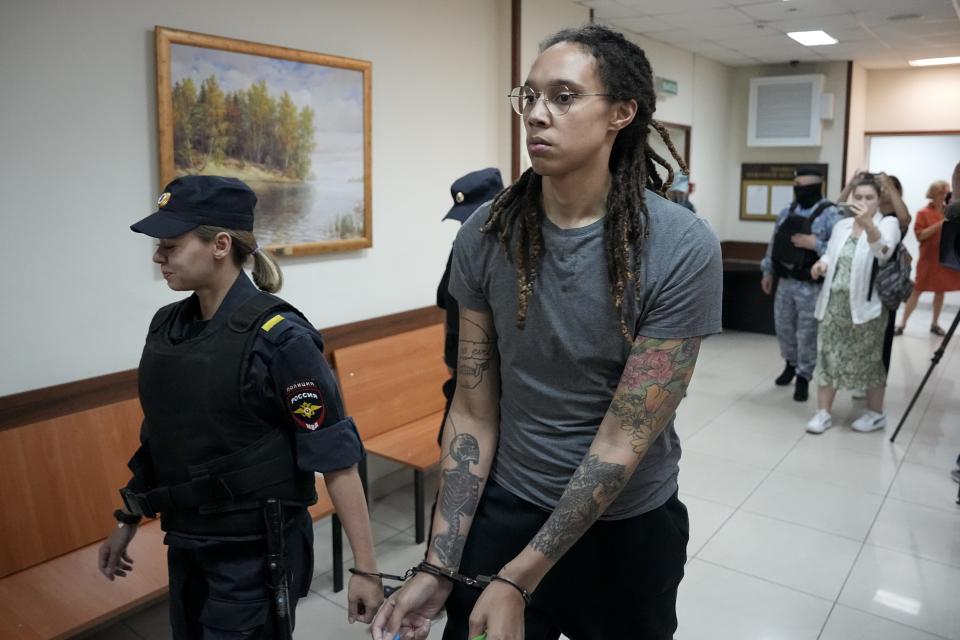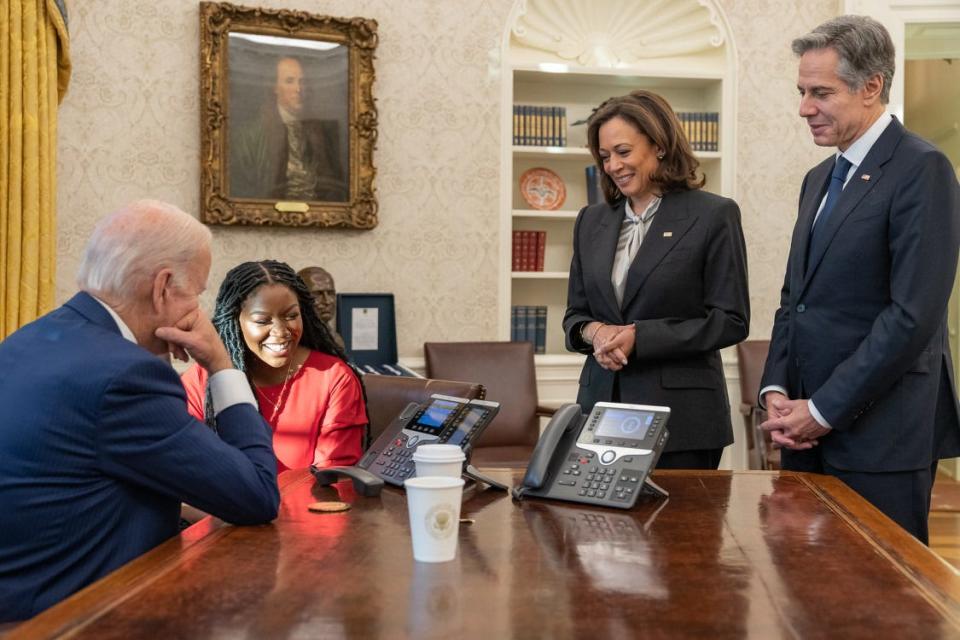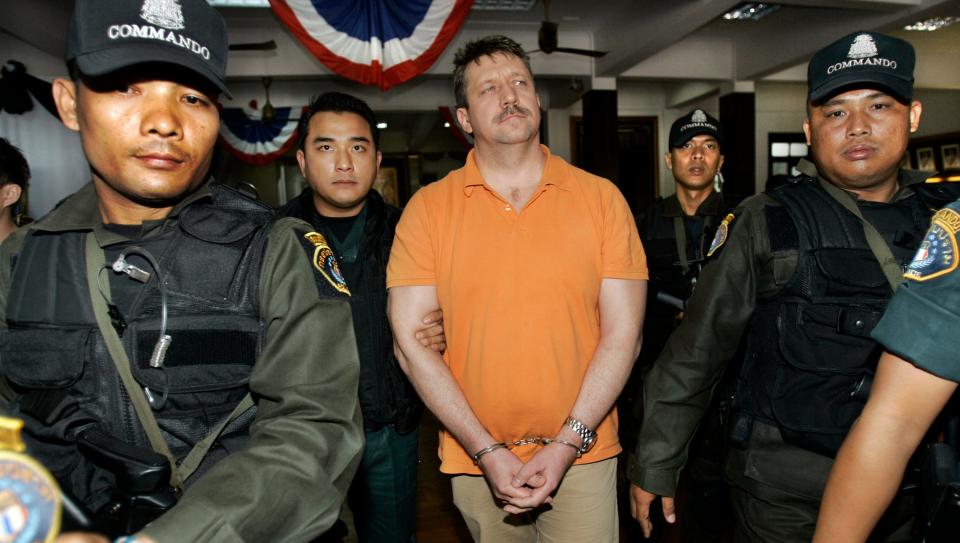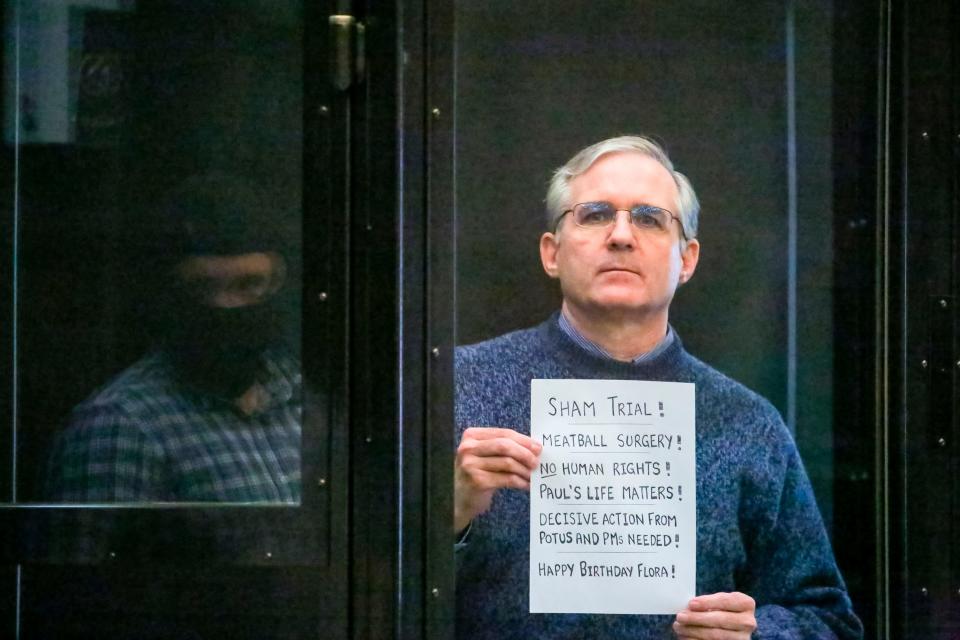Brittney Griner-Viktor Bout prisoner swap could affect future US-Russia relations. Here's how
- Oops!Something went wrong.Please try again later.
- Oops!Something went wrong.Please try again later.
WNBA star Brittney Griner's return is the product of complicated, often fraught negotiations between two countries engulfed in heightened tension over Russia’s invasion of Ukraine.
The prisoner exchange that swapped Griner out of Russia in return for Russian arms dealer Viktor Bout’s release from a U.S. prison shows there are still open channels for diplomacy between the two countries, even though some say their relationship is the worst it’s been since the Cold War.
But experts warn it likely doesn’t indicate anything beyond that in terms of partnership or change in either country’s strategy toward the war in Ukraine.
“It's not signaling any deepening of cooperation,” said Dan Hamilton, a nonresident senior fellow at the Brookings Institution’s Center on the United States and Europe. “It's just really a transactional effort to free Brittney Griner.”
Griner had been in Russian custody since February, when officials arrested her at a Moscow airport for carrying cannabis oil as she was returning to Russia to play for her professional basketball team there.

A prisoner exchange between countries with a tense relationship is not out of the ordinary, Hamilton said. He added that the U.S. has been careful to maintain channels of communication with Russia throughout its war on Ukraine.
Maintaining pathways for diplomacy, despite Russian aggression in Ukraine, is important for both the U.S. and Russia, said Victor Peskin, an associate professor at the School of Politics and Global Studies at Arizona State University.
“Not only for the prisoner swap we’ve just seen, but also for other issues, including geo-strategic issues in the world today,” such as Russia’s relationship with Iran, he said.
The swap shouldn’t be taken as any indication that there will be a change in Russian or American policy toward the war in Ukraine, said Rajan Menon, a nonresident scholar at the Carnegie Endowment for International Peace. For the Russian government, the decision was likely entirely pragmatic, he said.
“I think they saw this as an opportunity to achieve something they wanted for a long time, which is to get Viktor Bout back,” he said. “He’s probably seen as an intelligence asset and they wanted to get him out of there. So I'm not surprised that at some point they decided to relent on this one.
"Holding Griner, as far as I can tell, is of zero value to them strategically. She’s a young athlete. She’s not an intelligence agent.”

Implications, aftereffects of the swap
Perhaps, Hamilton said, the swap will lead to more public pressure on the U.S. secretary of state to designate Russia as a state sponsor of terrorism in response to its invasion of Ukraine. The designation is something that Ukraine has pushed for and that has received bipartisan support in Congress, but that Biden’s administration has opposed.
The European Parliament voted Nov. 23 to give Russia the designation.
Putting Russia on the list of “state sponsors of terrorism” — which currently includes Cuba, North Korea, Iran and Syria — would involve increasing sanctions not only against Russia but also against certain countries that trade with Russia.
The Biden administration has said that doing so could have unintended consequences for Ukraine, including by potentially limiting the U.S.’s ability to provide assistance in areas of Ukraine.
'The president kept his word':Members of Congress share Brittney Griner joy
Hamilton said that part of the reasoning behind not giving Russia the designation may have been that it could complicate prisoner swaps.
“So, if this is done, there might be more pointing to that to say, well, now you should do this,” Hamilton said. “I could see a little added pressure in the public space about that type of issue.”
Other than that, the swap isn't expected to have much immediate impact on relations between the two countries.
Rep. Ruben Gallego, who helped push for Griner’s release, said it raises the broader question of how the U.S. can stop “the Russias and the Chinas of the world” from consistently taking similar actions.
“This was clearly a created problem that Putin wanted and the Russians wanted,” Gallego, D-Ariz., said. “... I really think that we have to have an international plan with our allies to put pressure on China and Russia from taking sovereign citizens hostage for political aim.”
Does the swap embolden authoritarian regimes?
Sen. Mark Kelly, who advocated for Griner’s return, said the deal shows that these types of efforts can work, even given tensions between countries, and that U.S. officials need to do all they can to bring Americans home.
“It shows that we can negotiate with our adversaries in a way that has a positive outcome,” Kelly, D-Ariz., said. “I know myself, but I also think the White House and the State Department, are committed to bringing these individuals home that are unlawfully detained.”
Some Republicans said the prisoner swap for Bout, nicknamed the “Merchant of Death,” would empower Russian President Vladimir Putin to take more Americans.

But Menon, from the Carnegie Endowment, said that trading Griner for Bout doesn’t mean authoritarian regimes will take this as a green light to “grab an American” for a future prisoner exchange.
“Whenever there's an incident like this, it’s almost always said that, ‘Well down the road, this will embolden this government or that government to do something similar,’” he said. “It’s a commonly held view, but it’s a highly questionable view.”
People engaged in negotiations don’t necessarily look backward to draw conclusions from what occurred in previous prisoner exchanges, Menon said. “Every single swap will be determined by the particular conditions that are at play in that circumstance.”
Bout was in a U.S. prison for conspiring to kill Americans and supporting a terrorist organization. He was scheduled for release in 2029.
The administration faced criticism for taking Griner but leaving Whelan.
“This is a gift to Vladimir Putin, and it endangers American lives,” House Minority Leader Kevin McCarthy, R-Calif., wrote on Twitter. “Leaving Paul Whelan behind for this is unconscionable.”

Whelan, still detained in Russia, remains a priority
Whelan, a former U.S. Marine who’s been detained in Russia since 2018 on charges of espionage, was not part of the swap. The Biden administration negotiated for Whelan “through every step of the process,” but Russia was unwilling to include him in a deal, according to the White House.
“We've not forgotten about Paul Whelan, who's been unjustly detained in Russia for years. This was not a choice of which American to bring home," Biden said Thursday morning. “Sadly, for totally illegitimate reasons, Russia is treating Paul's case differently than Brittney's."
White House Press Secretary Karine Jean-Pierre said it was “a choice between bringing home one American or bringing home none.”
Menon at the Carnegie Endowment said the Biden administration must have “pulled out all the stops” to try to trade Griner and Whelan together for Bout.
“The Russians, I guess, were not willing,” he said. “The fact that the U.S.-Russia relationship is at the lowest point since the end of the Cold War … obviously didn't help matters.”
Russian leaders are likely looking for some other concession from the U.S. in exchange for Whelan, he said.
Menon doesn’t expect that concession would have to do with the U.S.’s aid to Ukraine, since that’s not likely to change, but that perhaps Whelan’s case could be folded into possible future peace negotiations.
Prop 207:Prop 207 frees Phoenix man after serving 28 years of life sentence
Paul Whelan’s brother, David Whelan, celebrated the release of Griner but expressed worry for his brother in a statement to media.
Kelly said he appreciated hearing from David Whelan that under the circumstances, this swap was the right thing to do.
“I know it’s a really difficult day for him but also for his family,” Kelly said of Whelan. “The Russians apparently were not interested in negotiating for his release. Maybe that will change. We’re going to continue to work to get back anybody who is unlawfully detained around the world, including Paul Whalen.”
Rep. Greg Stanton, who advocated actively for Griner’s freedom, pointed at the courage of Whelan’s family, whom he called “heroes.”
“I know this was an incredibly painful decision because Brittney’s coming home but Paul Whelan isn’t at this time,” he said. “I can’t even imagine. So they deserve the love from the people of America.”
Stanton said he’s learned from speaking with advocates for other Americans wrongfully detained that each case is unique and requires as much advocacy as possible for that individual person.
Hamilton, from Brookings, said Russia likely has candidates they want freed in exchange for Whelan. He said the U.S. has apprehended a number of Russian nationals over the years, including several in the cyberworld plus perhaps others who are intelligence officials.
“Despite the war in Ukraine, the Ukrainians and the Russians are exchanging prisoners, on a fairly regular basis. So this type of activity goes on, despite all of the tensions between countries,” Hamilton said.
USA TODAY contributed to this report.
This article originally appeared on Arizona Republic: Griner's return to US from Russia could have global ripple effects

